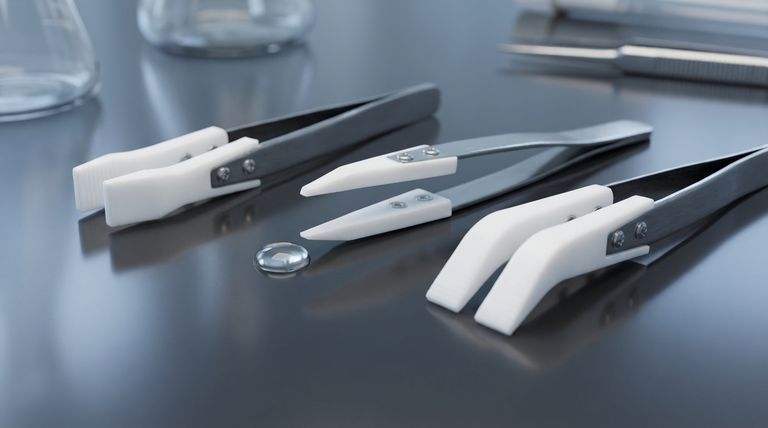At its core, Teflon is used in products requiring reduced friction because it has one of the lowest coefficients of friction of any known solid material. This property makes it intensely slick and slippery, allowing surfaces to slide against each other with minimal resistance. This drastically reduces both wear and the energy needed to overcome friction.
The central reason for Teflon's widespread use is its inherent molecular structure, which creates an exceptionally low-friction, non-stick surface. This allows it to function as a highly effective, built-in lubricant that remains stable even under high-pressure and high-temperature conditions.

The Core Reason: An Exceptionally Low Coefficient of Friction
The primary driver for using Teflon (the brand name for Polytetrafluoroethylene or PTFE) is its uniquely low resistance to sliding motion. This is quantified by its coefficient of friction.
What is the Coefficient of Friction?
The coefficient of friction is a simple value that measures the force of friction between two surfaces. A lower number signifies less resistance—or more "slipperiness."
Teflon's Unique Advantage
PTFE possesses an extremely low coefficient of friction. This means that objects coated in or made from Teflon slide past each other with very little effort.
Performance Without Lubrication
A key engineering benefit is that Teflon provides this low-friction characteristic in non-lubricated conditions. It does not require oil or grease to be effective, simplifying designs and reducing maintenance in mechanical systems.
Beyond Friction: The Supporting Properties of Teflon
Teflon's usefulness isn't just about being slippery. Several other properties make it a robust and reliable choice for demanding applications.
High Resistance to Wear
Low friction directly translates to less wear and tear. When parts slide easily, the abrasive forces that degrade materials over time are significantly diminished, leading to a longer product lifespan.
Durability Under Stress
Teflon is not only slick but also durable. Its inherent flexibility and high density allow it to withstand significant stress without failing.
This makes it especially valuable in high-pressure or high-temperature applications where less stable materials would quickly degrade or deform.
Preventing Leaks and Kinks
In applications like industrial hoses, Teflon's properties are critical. Its flexibility prevents kinking, while its high density creates a non-porous barrier, effectively preventing leaks of chemicals or gases.
Understanding the Trade-offs
While exceptional, Teflon is not a universal solution. Understanding its limitations is key to using it effectively.
Relatively Low Mechanical Strength
Compared to metals, pure PTFE is a soft material. It can be susceptible to scratching and can deform under very high concentrated loads, a phenomenon known as "creep." This is why it is often used as a coating or in composite materials.
Challenges with Adhesion
The very non-stick property that makes Teflon valuable also makes it difficult to bond to other surfaces. Attaching a Teflon layer to a metal substrate often requires complex chemical or mechanical etching processes.
Making the Right Choice for Your Application
Selecting a material depends entirely on the primary goal of your design.
- If your primary focus is creating a non-stick surface: Teflon's slickness makes it the definitive choice for cookware, chemical-resistant coatings, and industrial molds.
- If your primary focus is reducing wear in moving parts: Its ability to function without external lubricants makes it ideal for bearings, seals, and low-load gears.
- If your primary focus is reliable fluid transfer: Its combination of low friction, chemical inertness, and durability makes it a superior material for high-performance hoses and pipe liners.
Ultimately, Teflon's value comes from its rare combination of extreme slipperiness and robust chemical and thermal stability.
Summary Table:
| Key Property | Benefit for Friction Reduction |
|---|---|
| Extremely Low Coefficient of Friction | Creates an intensely slick, non-stick surface for easy sliding. |
| Functions Without Lubricants | Simplifies design and reduces maintenance in mechanical systems. |
| High Wear Resistance | Drastically reduces abrasive wear, extending product lifespan. |
| Durability Under Stress | Maintains performance in high-temperature and high-pressure environments. |
Need a high-performance, low-friction component?
At KINTEK, we specialize in precision manufacturing of PTFE components like seals, liners, and custom labware. Our expertise ensures your products benefit from Teflon's exceptional slipperiness and durability, whether for semiconductor, medical, laboratory, or industrial applications. From prototypes to high-volume orders, we deliver the reliability your designs demand.
Contact our experts today to discuss your custom PTFE solution!
Visual Guide

Related Products
- Custom PTFE Parts Manufacturer for Teflon Parts and PTFE Tweezers
- Custom PTFE Parts Manufacturer for Teflon Containers and Components
- Customizable PTFE Rods for Advanced Industrial Applications
- Custom PTFE Teflon Balls for Advanced Industrial Applications
- Custom PTFE Sleeves and Hollow Rods for Advanced Applications
People Also Ask
- What are the key advantages of PTFE? Unmatched Performance for Extreme Environments
- What industries use PTFE machined parts and for what applications? Critical Components for Demanding Environments
- What are the main advantages of using PTFE parts in industrial applications? Unlock Unmatched Chemical Resistance and Reliability
- What are the future considerations for machining Teflon? Mastering Material Challenges with Smart Tech
- What are the key considerations when machining Teflon? Master Precision Machining for Soft Polymers



















